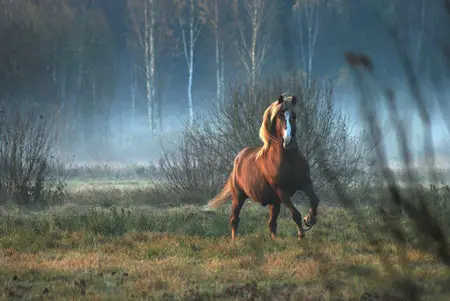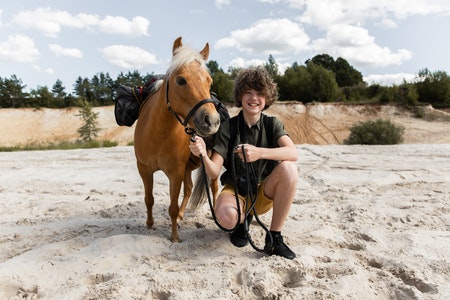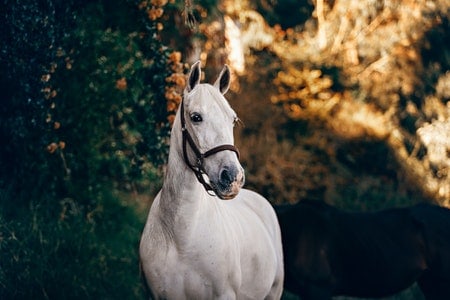The average horse should weigh about 1,200 pounds. However, due to diet and exercise habits of the owner, some horses can be overweight or obese. Carrying extra weight on your horse’s body is not only bad for his health but also makes it difficult for him to move around comfortably.
You feed it hay, give it some grain, maybe even some sweet treats every now and then but nothing is working. What’s the problem?
Your horse has probably developed insulin resistance which can lead to diabetes if not dealt with quickly. It doesn’t have to be this way though! In this blog post I’ll share three ways of dealing with an overweight horse: diet changes, exercise regimes and nutritional supplements that will help your overweight equine friend get back on track while still enjoying their favorite foods like carrots or apples!
When is a Horse Overweight?
A professional assessment is the best way to determine a horse’s or pony’s weight and body condition. Weigh tapes are only useful for monitoring your animal, but they cannot accurately measure its true fat content which means that you will have no idea if it needs more food than what you’re already feeding them.

Body condition scoring systems can help provide an accurate measurement of where your horses/ponies stand on the scale between too thin (bones visible) and too obese (no bones). However, these measures are still subjective in nature because some owners struggle with assessing their own animals’ health without input from someone else – such as themselves!
Horses have a tendency to steadily put on weight and it can be difficult to notice unless you are constantly checking your horse’s waistline. Regularly monitoring the body weight of horses not only helps people keep an eye on how their management regime is affecting the horse, but also allows them to supply just enough wormer for each situation.
It becomes even more problematic when someone doesn’t take note that they need additional supplies because they failed at noticing the steady increase in weight – this should prompt you into action sooner rather than later so as not let things get out of hand!
Regularly measuring your horses’ height makes it easier for owners and veterinarians alike monitor whether or not there has been any growth spurts recently which may require increased feed.
What to Feed Overweight Horse
Feeding overweight horses a mature grass hay will help them to maintain their weight. A higher energy, immature hay may mean that the horse is overfed and not getting enough of the nutrients they need from food. Always make sure you weigh your horse’s hay ration before feeding it to be safe!
The innovative minds at North Carolina State University (1) say that incorporating feed obstacles in your horse’s feeder can slow their intake. This is because the balls are effective at extending (by 4 minutes) and maintaining the time it takes them to consume food after multiple days of use, as well as producing a lower glucose response than other feeding methods tested.
Horses on a restricted diet are susceptible to overeating. You can slow the equine feed intake by altering how you deliver their food. Slow your horse’s eating habits by experimenting with different ways to feed them such as in small, frequent servings.
Health Risks of an Overweight Horse
Disease
Overweight horses are more likely to develop disorders and diseases, including –
- Laminitis
- Equine Metabolic Syndrome
- Insulin dysfunction.
Their levels of the stress hormone cortisol can also be elevated when compared with non-overweight animals.
Reduced Performance
When a horse becomes overweight, their performance and use declines.
Bearing excessive weight strains muscles as they try to work properly which can make it harder for the horse to function normally. This is especially true when considering hoof health; obesity weakens the hoof wall, heel buttress and bars of each foot by adding pressure from increased girth circumference while simultaneously reducing blood flow due to tightened fascia in these areas.

Obesity also impacts joint dysfunction such as arthritis because joints end up bearing more stress than usual with an overweight animal’s movement pattern that includes less locomotion or elevated impact on any given step taken on irregular surfaces like rocks or height differences.
Overweight horse – 3 things to do
Diet Changes
If you want to lose weight, then your horse does too. One of the major keys is having a daily calorie deficit through diet and exercise. This can be hard because it’s easy for portions to creep up when estimating by volume instead of count so make sure they’re always eating less than they should on any given day!
Horses are very different from humans. For example, we can go for weeks without food and still be fine while they only need to graze or eat hay occasionally because of their high level of energy expenditure when compared with us!
If a bucket feed is required then low calorie fiber feeds may suffice but remember not all the time since this will make them gain weight instead of lose it like humans do. So don’t overdo anything unless you know exactly how much nutrition your horse needs.
So you know how much to feed your horse before embarking on a diet, it’s important for them not to be suddenly restricted in the amount of food they receive. Horses and ponies should start out at 1.5% – or 7.5kg if their current weight is 500kg – gradually reducing what was being fed from 14 kg per day down to that level instead over time so as not cause any harm with sudden changes in intake levels.
It is important to gradually reduce the amount of feed your horse receives before embarking on a diet as it is not advisable for them to suddenly have restricted intake.
Exercise Regimes
Horses need to be continually entertained, but sometimes it’s hard for them to find ways of keeping themselves busy. Using haynets and other items will help keep your horse from getting bored or frustrated with their food!

Exercise is a great way to lose weight, but it should be gradual and health of the horse should always come first.
Increasing exercise for an overweight horse can help with balance overall calorie expenditure as well as intake, but this process has to take place slowly in order not have any negative effects on the horses’ heath or increase their heart rate too much – which would only leave them more tired out after they’ve finished exercising!
The good news however is that if you are also trying to get healthier yourself then increasing your own physical activity will certainly make what you’re doing easier because all types of exercises work together towards helping us achieve our goal.
Nutritional Supplements
Some people feed their horses with hay or pasture alone, but this can be dangerous because of the lack in diversity. When a horse is on just hay and grass for food they must eat more to meet their dietary requirements which leaves them susceptible to bloating. To prevent these problems it’s important that you give your horse an energy supplement like oats as well as vitamins and minerals supplements so that deficiencies don’t arise.

